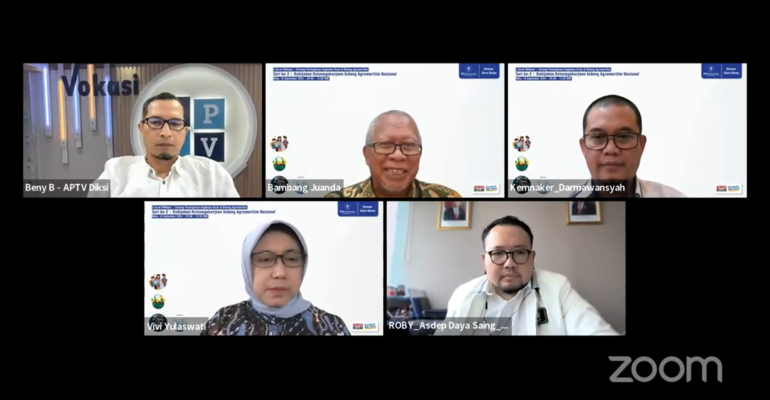IPB University’s Board of Professors Explores Strategies for Increasing the Agromaritime Labour Force

After previously exploring insights from the academic side, the IPB University Board of Professors (DGB) is now also exploring from the government side regarding strategies for increasing and developing the agromaritime workforce. This was stated in the 2nd Webinar series themed ‘National Agromaritime Labour Policy’.
Roby Fadillah, MSc as Assistant Deputy for Competitiveness Improvement, Coordinating Ministry for Maritime Affairs and Investment (Kemenkomarves) explained several strategies to increase the workforce in the agromaritime sector. Firstly, the importance of skills and competency certification for the workforce, which must be fulfilled to meet international standards. “We have to ensure that workers get globally recognised certifications,” he said.
Second, the development of training institutions in the regions, especially in eastern Indonesia, to facilitate access to certification. Third, there needs to be collaboration between the government, the business world, and educational institutions to create a link and match between training and industry needs.
In an effort to increase the labour force in the agromaritime sector, Darmawansyah, MSi, Expert Staff for Inter-Institutional Relations at Maritime Affairs also emphasised several key strategies. First, revitalising vocational education and training that is integrated with market needs. This aims to improve labour skills, especially in the agriculture, forestry and fisheries sectors.
“Second, encouraging the interest of the younger generation to work in the agromaritime sector by offering incentives and relevant training programmes. The interest of the younger generation to work in this sector is still low, so there needs to be an innovative approach to attract them,” he said.
Third, he continued, is strengthening the labour market information system to facilitate access to information about job opportunities in agromaritime. This will help workers find jobs that match their skills.
On the same occasion, Dr Vivi Yulaswati, Deputy for Maritime Affairs and Natural Resources at the Ministry of National Development Planning, also emphasised the importance of a clear definition of agromaritime human resources. “We need to understand the scope and qualifications of human resources in this field so that development is more targeted,” she concluded.
According to her, limited competence and the gap between education and market needs are challenges. “Super priority programmes must support the development of skilled and competitive human resources,” she said.
She also highlighted the importance of digitalisation and integration of the blue sector in development plans, hoping that the contribution of maritime gross domestic product (GDP) can increase significantly. ‘”Innovation and entrepreneurship must be encouraged to accelerate transformation in the agromaritime sector,” she continued.
In addition, Dr Beni Bandanajaya, Academic Director of Vocational Higher Education, Ministry of Education, Culture, Research and Technology (Kemendikbudristek) was also present. He conveyed the importance of vocational education in the agromaritime sector, which is designed to produce a highly skilled workforce.
He revealed that currently, there are around 6.000 students in fisheries and marine vocational programmes, with the majority in polytechnics. He noted that only 13 per cent of Indonesian students are in vocational education, pointing out the challenges in expanding participation rates.
Dr Beni also underlined the need for collaboration between universities and industry to ensure the relevance of education to labour market needs. He added, “Mandatory internships for students are important to create job-ready graduates.”
In the face of the 2030 demographic bonus, he also emphasised that improving the quality of vocational education is crucial to improving national competitiveness. (MW/Rz) (IAAS/RUM)



